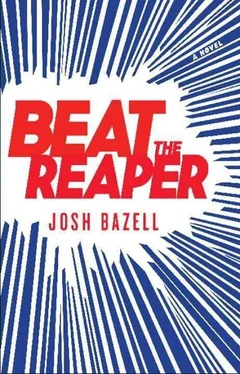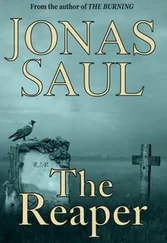“Relax,” I say. “Right now I’m not even sure I’m going to kill you.”
A moment later I realize this is true, because I’ve figured out how to do it if I have to.
I’ll just jack him with potassium. If I do it slowly enough, it will stop his heart without spiking his EKG, [13] Electrocardiograms are abbreviated “EKG” because “ECG” sounds too much like “EEG,” which is an electroencephalogram. Or maybe Willem Einthoven, who invented them, called them “electrokardiograms.”
and after he’s dead so many of his cells will burst that his whole body will be flooded with potassium.
“Jesus,” he says. “For all I know I have cancer anyway.”
“You do have cancer,” I say.
“What do you mean?”
“I just read your biopsy results.”
“Jesus! Is it bad?”
“No, it’s fantastic. That’s why everybody wants it.”
Squillante, with tears in his eyes, shakes his head. “Such a fuckin smartass. From the time you were a kid.” He grabs my ID badge. “What are they calling you these days, anyway?”
When he reads it he boggles. “‘Peter Brown’? Like in the Beatles song?”
“Yeah,” I say, impressed. [14] “Peter Brown called to say / You can make it O.K. / You can get married in Gibraltar near Spain.” Peter Brown was the longest-serving roadie for the Beatles.
“They changed your name from Pietro Brnwa to Peter Brown? How stupid do they think we are?”
“Pretty fuckin stupid, apparently.”
An announcement comes out of the PA in the ceiling: “Code Blue. All available medical staff to 815 South.” It repeats a couple of times.
Squillante realizes what’s up. “I won’t say shit, Bearclaw,” he says. “I promise.”
“If you do, I’ll come back and kill you now. Are you capeeshing that, you dickhead?”
He nods.
I grab the phone cord and rip it out of the wall on my way out.
I reach the code. The hallway outside of it, anyway.
All the world loves a code, because you get to act like you’re on television. Even if you don’t get to yell “Clear!” with the defibrillator paddles, you might get to squeeze the respirator bag, or inject drugs handed to you by nurses from out of the crash cart. Also, people come from all over the hospital—not just from Medicine, for whom it’s mandatory—so it’s a great opportunity to socialize. And if the person who called the code did it because the patient is actually crashing, you might even save someone’s life, and justify your awful career choice.
This is not one of those times, however, I remember as soon as I get there. This is one of those times when the patient’s been dead for hours, and some nurse is trying to cover his Latvian ass.
“Who’s got time?” I say.
A nurse named Lainie turns around with a stopwatch and a checklist of who’s required to be there. “Yo hi, Dr. Brown,” she says. She winks. “I already put you down.”
“Thanks,” I say. Lainie’s foxy, but she’s married. Granted, to a man who looks twelve and wears a basketball jersey long enough to be a cocktail dress, but homey don’t play that.
What homey do play is getting back to Squillante’s room. And either killing him or figuring out what to do about him instead.
There doesn’t seem to be an obvious choice. If I let him live, and he tells David Locano where I am, I’m either dead or on the run. On the other hand, supposedly I work at a hospital to make up for killing people.
Or something along those lines.
“Sir?” It’s a small voice behind me. I turn.
My medical students. Two cups of human misery in short white coats. One is male and the other one female, and they both have names. That’s all I can ever remember about them.
“Good morning, sir.”
“Don’t call me sir. I work for a living,” I say. “Go check labs.”
This mostly confuses them, but one of them says, “We already did.”
“Then just stay here.”
“But—”
“Sorry, kids. I’ll teach you something later. [15] This basic interaction—Good morning, sir/Sorry, kids. I’ll teach you something later—is the primary activity of the last two years of medical school. The primary activity of the first two years is a PowerPoint presentation by whatever bitter, unpaid PhD was too slow to avoid getting tapped by the dean that morning.
And I’ll see you at Attending Rounds at seven thirty.”
Of course, ten feet farther on I get beeped by Akfal, who’s in the Intensive Care Unit. “You got a minute?” he says when I phone him back.
Instead of “No,” I say, “Is it serious?” Which is a stupid question, since Akfal wouldn’t page me if it wasn’t. He doesn’t have that kind of time.
“I need your help on a thoracostomy.”
Fuck. “I’ll be right there,” I tell him.
I turn back to my med students. “Change of plans, kids,” I tell them. “Uncle Akfal’s got a procedure for us.”
As we head toward the fire stairs, one of the med students nods nervously back toward the code. “Isn’t that our patient, sir?”
“She’s God’s patient now.”
Thoracostomy is just sticking a sharpened tube through someone’s chest wall. You do it when the amount of blood—or pus, or air, or whatever—in their thorax is starting to compress one or both lungs, making it difficult for the person to breathe. You have to avoid the key organs—lungs, spleen, liver—and the undersides of the ribs, since the undersides are where the vein, artery, and nerve run. (You can see this on a rack of ribs, even after it’s been cooked. Then you can go yack.) But otherwise placing a chest tube is simple, as long as the patient’s holding still.
Which is never. That’s where I come in. Though it gives me no joy to admit it, the medical task I perform nearest to perfection is holding people down. My med students are about to get a rare glimpse of genius.
So I’m surprised when we get to the Intensive Care Unit to find the patient canted over on his side, with his eyes open and his tongue hanging out. In fact I’m worried he died while Akfal was phoning me, but then I feel the patient’s carotid and it’s pulsing fine, though there’s no indication he can feel me checking. “Was he like this before?” I ask.
Akfal’s setting up a procedure table, using all Martin Whiting Aldomed materials. “Apparently he’s always like this. Massive CVA [16] “CVA” stands for “cerebrovascular accident,” or stroke. A brain artery either getting jammed (usually by a clot, usually from your heart) or outright exploding. Meet the Reaper: it’s the number two cause of death in the United States.
six years ago.”
“So what do you need us for?”
“Chart says he’s capable of sudden violent movements.”
I tap the guy’s eyeball. No response. “Somebody’s bullshitting you. The guy’s a lawsuit Barbie.”
“Probably.” He opens a pack of Dermagels onto the blue paper tablecloth he’s set up, then pulls them on one at a time, touching only the insides with his skin. “Ready,” he says.
I crank the bed up, and each med student takes a leg. I untie the guy’s gown and let it drop to his waist. The guy is saggy with coma fat.
Akfal iodine-sponges a patch on the lower left ribcage, then picks up the tube. I throw an arm across the top of the guy’s chest and arms.
Akfal jabs. The patient screams and boots both med students off his legs so hard they hit the walls. One of them also knocks over some kind of monitor.
But the tube is in. In what is up for debate, since the fluid that sprays out—and across Akfal’s chest and face before he can grab up a bedpan to deflect it—looks like dark, ropy blood. After a couple of moments it begins to pulse out normally.
Читать дальше










